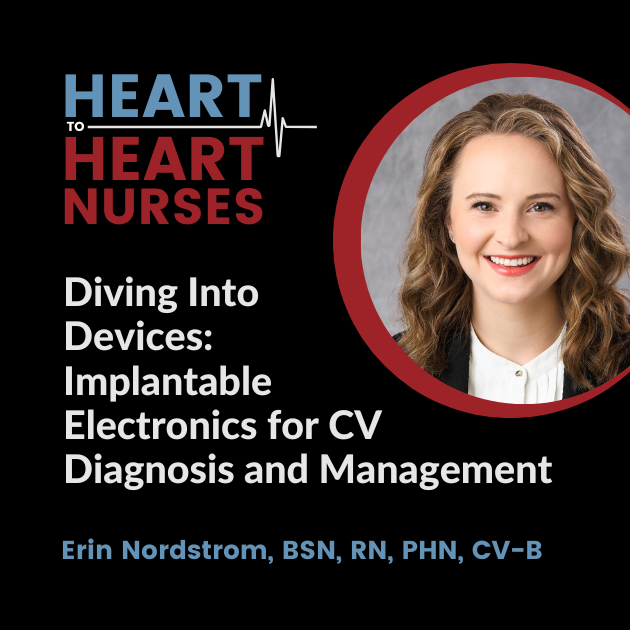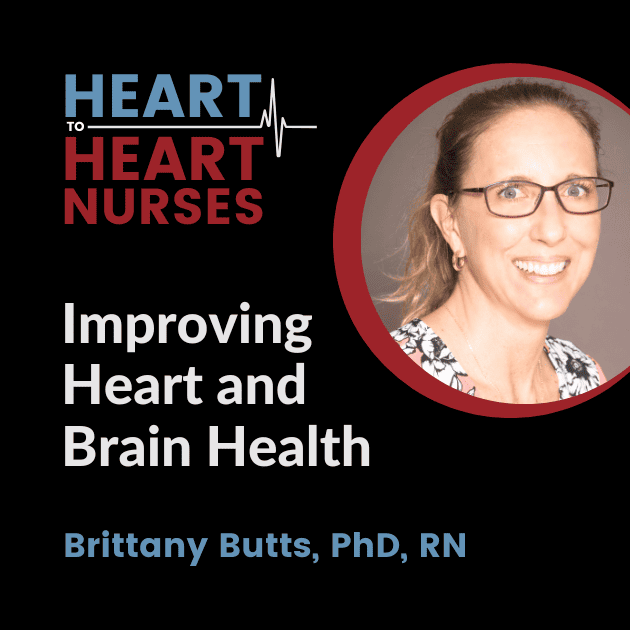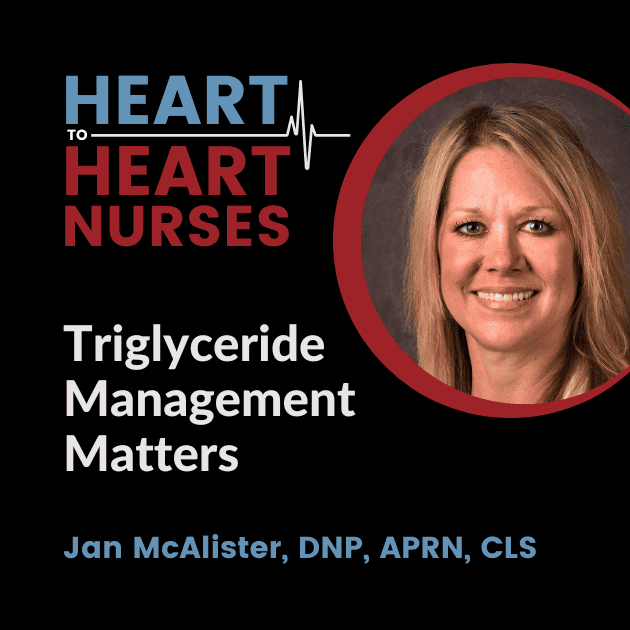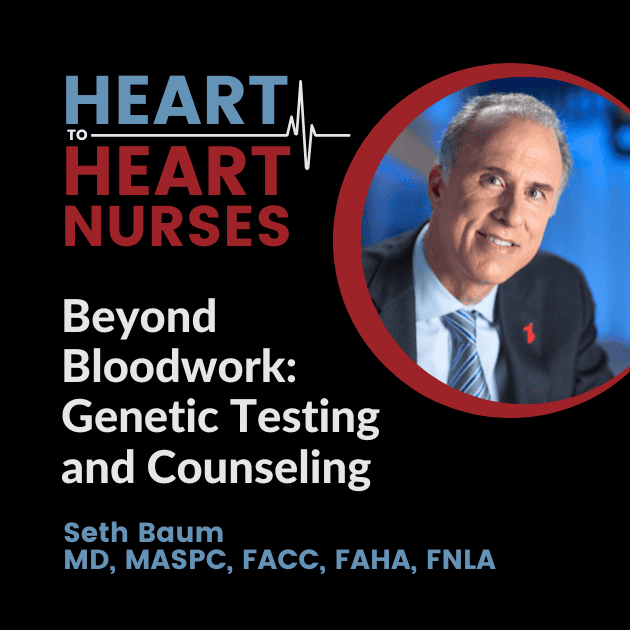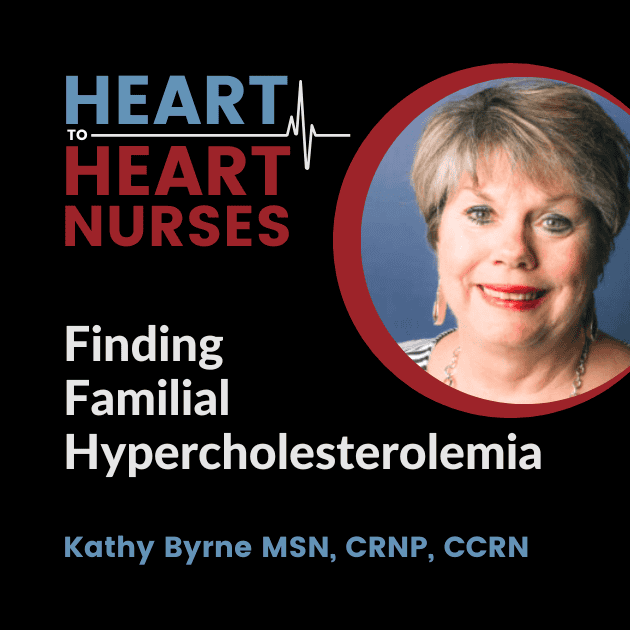Episode Resources
Welcome to Heart to Heart Nurses, brought to you by the Preventive Cardiovascular Nurses Association. PCNA's mission is to promote nurses as leaders in cardiovascular disease prevention and management.
Geralyn Warfield (host): Welcome to today's episode where we have the great pleasure of speaking with Virend Somers. Virend, could you please introduce yourself to our audience?
Virend Somers (guest): Yeah, thanks, Geralyn. My name's Virend Somers. I'm a Professor of Cardiovascular Medicine at the Mayo Clinic in Rochester, Minnesota.
Geralyn Warfield (host): Well, we are so excited to have you and your expertise at the table today.
Could you share with our audience about the effects of sleep deprivation and obesity?
Virend Somers (guest): So, sleep deprivation and obesity are closely linked. So, people who are overweight or obese we know tend to sleep poorly, just generally. And not every obese person sleeps poorly. [00:01:00] But if you're obese, the chances are that you don't sleep as well as someone who's not obese. So that's the first thing.
The second is that people who sleep less tend to be more obese. And the question is, is there a cause and effect? And, you know, we and others have shown that if you take healthy young people and you cut down the amount of sleep they get, say to four or five hours a night, they will actually eat more over the course of the day.
So, people who are sleep deprived tend to eat more calories. And the problem is those calories that they eat tend to be stored as visceral fat, so fat inside the belly, the unhealthy fat. So, we have ways of storing fat. Subcutaneous fat is a kind of a relatively healthy compensatory [00:02:00] fat storage mechanism.
When that becomes a problem is when the fat is stored viscerally inside the belly around the pancreas, the liver, the kidney, the gut. That's the fat that is toxic, that produces substances that damage the blood vessels that increase your risk of cardiovascular disease.
So, when you take healthy young people, and you sleep deprive them, not only do they eat more calories, but they also store those calories inappropriately in the visceral fat compartment. So, it does seem like there is a cause-and-effect relationship between inadequate sleep and a higher likelihood of not just being obese, but being obese in a way that is potentially harmful to the cardiovascular system. In other words, being viscerally obese, having a high belly fat component.
Now, we know [00:03:00] that obesity has increased in prevalence over the last 30 years. And we also know that sleep deprivation has increased in prevalence in part because of work requirements. In part because of emails. Then we have the smartphones, and then we have Facebook, and constant engagement with computer screens. And so that may be part of the reason why there's this propensity towards a population-wide increase in obesity.
Geralyn Warfield (host): I appreciate the fact that there are some biological factors at play here. And I think there's also some emotional side to this. And I'll use myself as an example, that when I'm sleep deprived, I know I'm supposed to be eating healthy, but I turn to foods or beverages that aren't as healthy for me because I'm looking for comfort, or I'm looking for caffeine, or I'm looking for some other modality to basically compensate for that lack of sleep.
[00:04:00] And I suspect that probably plays in for at least some individuals to the reliance on unhealthy foods compared to when you're well-rested and you feel like you're making better decisions.
Virend Somers (guest): Correct. And the decisions is a key word. It's your judgment. Your ability to make the appropriate call is much better when you are well rested, when you've had enough sleep than when you are sleep deprived.
So, the ability to make that decision that, “Okay, I'm going to avoid that sweet tasting, short lasting comfort food, but rather go with something more healthy. Because I do know in the longer term it's beneficial.” Well, that ability to make that differentiation, and to make that decision is, impaired when you don't have enough sleep.
As most decisions, you know, with sleep deprivation, your ability to make decisions [00:05:00] generally is compromised.
Geralyn Warfield (host): We are going to take a quick break. And we will be right back.
Geralyn Warfield (host): And we're back speaking with Virend Somers about the connection of sleep deprivation and health. And I'm hoping we can pivot just a little bit. You started to speak about it before we took our little break, about sleep deprivation and its effect on cardiovascular health.
Virend Somers (guest): Not only is inadequate sleep linked to obesity, but it's also linked to poor cardiovascular health, as you suggested.
We do know that people who sleep less, particularly women, tend to be at higher risk for hypertension, diabetes, heart disease, and we'll call it incident heart disease—so new onset.
The Nurses Study, which was a study of more than 70,000 nurses over about 16 years or so, showed that when you took the [00:06:00] nurses who slept five hours versus six versus seven versus eight, the ones who slept five hours a night had the greatest likelihood of weight gain over the period of follow-up.
Not only they have more weight gain, but they also had an almost twofold increased risk of incident cardiovascular disease, incident meaning new onset, so coronary artery disease that they never had before now rears its head over 15 to 16 years, and that likelihood was doubled in nurses that slept five hours or less per night.
So, observational, epidemiologic data suggesting this link between sleep duration and cardiovascular risk.
Now we also know from short-term studies that people who, if you take a group of people, put them in a lab for four hours, I mean for three weeks, and let them sleep four hours per night [00:07:00] versus bringing them in another time, letting them sleep eight hours per night—and this is a study that we did at Mayo—the time when they slept four hours per night was accompanied by a higher blood pressure level, particularly in women. There was higher blood pressure in the daytime, but even when they were sleeping during the night.
Geralyn Warfield (host): So, there are a lot of different impacts…
Virend Somers (guest): Yes.
Geralyn Warfield (host): …of poor sleep. And I think that, it's like lifestyle. It's one of the most difficult things to.do. You know it's the right thing, you know?
Virend Somers (guest): Yes.
Geralyn Warfield (host): Your healthcare professional might say to you, “You need to get more sleep.” And then, I'm sure this has happened to our listeners, like it has happened for me, where you get to sleep at a particular time and you know you're supposed to be getting to sleep and your brain is just running full bore on the problems at work, or at home, and those kinds of things.
And then, you know, an hour or more has gone by and you look at the clock and you're like, “I'm okay now. Now I really need to be asleep.” And it's just hard to [00:08:00] unwind.
So, are there any suggestions that you would have for our listeners and for their patients in terms of any key things that they would do? I heard you say maybe unwinding from electronics or unplugging from electronics early on.
Virend Somers (guest): Yes.
Geralyn Warfield (host): What other kind of sleep-related activities should they be doing or not doing to help?
Virend Somers (guest): So, let's talk about the period before they go to sleep. So, during those two or three hours before they sleep, I would avoid alcohol, avoid intense exercise and avoid bright lights.
Having darkness during the period prior to sleep allows you to start producing melatonin and gets you primed to actually go to sleep. And you also want to avoid heavy meals around the time of sleeping.
And then when you sleep, the bedroom is for sleep and sex. Not for spreadsheets. Not for TVs. You don't want to go to bed, and your body thinks, “Oh, great, it's time for TV.” The body [00:09:00] needs to learn that when you get into bed, that's the time for sleep.
And in the bedroom itself, you want to avoid any lights whatsoever. Even a little LED that’s in the bedroom can affect your sleep quality. Just small amounts of light. Even a night light in the bedroom can be a problem for sleep quality.
So, you want to have the bedroom as dark as possible, and you want it to be somewhat cool and you want minimal ambient noise. So, a ticking clock is terrible. You don't want a ticking clock in the bedroom. You don't want any kind of noise, and you really don't want a TV in the bedroom, or a radio.
In terms of having pets in the bedroom, it's a subjective question. If you sleep better with your pets in the bedroom, then that's fine. If you sleep worse, then you probably want to, you know, not have them in the bedroom.
If you have a [00:10:00] spouse who snores, then that's another judgment call. Probably they want to be treated, but it depends to what extent, and it's a balance between the quality of sleep with having someone next to you versus the noise. And sometimes having some white noise in the bedroom may be helpful.
And then waking up. It's best to wake up spontaneously and not with an alarm clock. By definition. If an alarm clock wakes you from sleep, you did not get enough sleep. And so, you would know that you've had enough sleep if you wake up spontaneously, and you wake up without an alarm clock, and you wake up feeling rested.
Geralyn Warfield (host): All exceptional ideas for us all to get a better night's sleep. Do you have one key takeaway you would like our listeners to have as a result of our conversation?
Virend Somers (guest): I would say that, for those who take melatonin supplements to help them sleep, [00:11:00] to be aware that these over-the-counter supplements, you know, there's no clear indication of how pure they are, what other impurities there are in there, how much melatonin there is in each preparation--you know, analyses have shown varying amounts. So, you want to be circumspect about which melatonin preparation.
First—should you use it is a question. And my advice is if you do use it, you want to be sure it's helping you. And I would suggest intermittent use is better than constant use, as with most things.
And if you do need to use melatonin, then you want to use a supplement that you can be comfortable is a pure melatonin preparation. And you can, people can look up on the internet for some options that are pure melatonin, proven by assay to be melatonin and not a collection of impurities with the [00:12:00] varying amounts of melatonin in it.
Geralyn Warfield (host): Virend Somers, thank you so much for taking time to share your expertise with us today. I'd like to thank our audience for joining us. This is your host, Geralyn Warfield, and we will see you next time.
Virend Somers (guest): Thank you, Geralyn.
Thank you for listening to Heart to Heart Nurses. We invite you to visit pcna.net for clinical resources, continuing education, and much more.
Subscribe Today
Don't miss an episode! Listen to the Heart to Heart Nurses podcast on your favorite podcast listening service.







